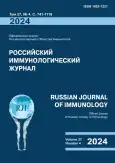Antibodies to HIV-1 gp120 in an experimental model of atherosclerosis caused by immunization with native high-density lipoproteins
- Authors: Snigirev A.Y.1, Terentieva O.S.1, Shklyaeva N.P.1
-
Affiliations:
- Udmurt State University
- Issue: Vol 27, No 4 (2024)
- Pages: 883-886
- Section: SHORT COMMUNICATIONS
- URL: https://journal-vniispk.ru/1028-7221/article/view/267872
- DOI: https://doi.org/10.46235/1028-7221-16694-ATH
- ID: 267872
Cite item
Full Text
Abstract
Antibodies to bacterial and viral antigens are detected in some systematic autoimmune diseases in the absence of infection. Autoimmune MRL mice and patients with mixed connective tissue disease produce antibodies to gp120 HIV-1, despite the fact that they had never been exposed to HIV-1. Conversely, viral infections may be accompanied by pathological autoimmune reactions. Reactivity to viral antigens in autoimmune diseases and autoimmune reactions in viral diseases are caused by the induction of antibodies via idiotype-anti-idiotype interactions between autoclones and lymphocyte clones against foreign antigens or homology of foreign antigens and autoantigens. Cardiovascular diseases caused by atherosclerosis are currently one of the main causes of mortality in HIV infected patients. It is assumed that HIV infection accelerates atherogenesis. The mechanisms of the association between HIV infection and atherosclerosis are not completely clear. Chronic activation of the immune system, disturbance of cytokine regulation caused by HIV infection, induction of autoantibodies against oxidized low-density lipoproteins (LDL) and antibodies to ApoB-D are considered as possible factors of atherogenesis in HIV infection. The aim of this research was to determine whether an atherogenic immune response against native human high-density lipoproteins (nHDL) could induce antibodies to gp120 HIV-1. Studies were conducted on model of autoimmune atherosclerosis caused by immunization with native human HDL in rabbits. Rabbits (n = 6) were one-time intradermally immunized with human nHDL at a dose of 200 μg of protein per animal in incomplete Freund’s adjuvant. Antibodies to gp120 HIV-1 were measured before immunization of rabbits and on the 28th and 42th day after immunization with HDL, and antibodies to HDL were weekly measured within 42 days after immunization. Histological analysis of the aorta was conducted after eight months after immunization. Transient anti-gp120 HIV-1 antibody production was detected in rabbits immunized with native HDL. The appearance of antibodies to gp120 HIV-1 in response to immunization with native HDL which causes atherosclerosis suggests that the immune response to gp120 HIV-1 during HIV infection may be accompanied by the production of atherogenic antibodies to HDL. Consequently, the antibodies to native lipoproteins caused by an immune response against gp120 HIV-1 may be a factor in atherogenesis during HIV-1 infection.
Full Text
##article.viewOnOriginalSite##About the authors
A. Ya. Snigirev
Udmurt State University
Author for correspondence.
Email: Alex.Snigirev72@yandex.ru
Postgraduate Student, Department of Immunology and Cell Biology
Russian Federation, 1 Universitetskaya St, Izhevsk, 426034O. S. Terentieva
Udmurt State University
Email: Alex.Snigirev72@yandex.ru
Junior Research Associate, Laboratory of Molecular and Cell Immunology
Russian Federation, 1 Universitetskaya St, Izhevsk, 426034N. P. Shklyaeva
Udmurt State University
Email: Alex.Snigirev72@yandex.ru
Junior Research Associate, Laboratory of Molecular and Cell Immunology
Russian Federation, 1 Universitetskaya St, Izhevsk, 426034References
- Arthur J.M., Forrest J.C., Boehme K.W., Kennedy J.L., Owens S., Herzog C., Liu J., Harville T.O. Development of ACE2 autoantibodies after SARS-CoV-2 infection. PLoS One, 2021, Vol. 16, no. 9, e0257016. doi: 10.1371/journal.pone.0257016.
- Da Cunha J., Ferreira Maselli L.M., Treitinger A., Monteiro A.M., Gidlund M., Maranhao R.C., Spada C., Bydlowski S.P. Serum levels of IgG antibodies against oxidized LDL and atherogenic indices in HIV-1-infected patients treated with protease inhibitors. Clin. Chem. Lab. Med., 2013, Vol. 51, no. 2, pp. 371-378.
- Douvas A., Takehana Y. Cross-reactivity between autoimmune anti-U1 snRNP antibodies and neutralizing epitopes of HIV-1 gp120/41. AIDS Res. Hum. Retroviruses, 1994, Vol. 10, no. 3, pp. 253-262.
- Fonseca H.A.R, Gidlund M., Sant’Anna V.R., Fernandes E.R., Fonseca F.A.H., Izar M.C. HIV-infected naive patients exhibit endothelial dysfunction concomitant with decreased natural antibodies against defined apolipoprotein B autoantigens. Arq. Bras. Cardiol., 2021, Vol. 116, no. 4, pp. 844-849.
- Kanduc D., Shoenfeld Y. Molecular mimicry between SARS-CoV-2 spike glycoprotein and mammalian proteomes: implications for the vaccine. Immunol. Res., 2020, Vol. 68, no. 5, pp. 310-313.
- Kearns A., Gordon J., Burdo T.H., Qin X. HIV-1–associated atherosclerosis: unraveling the missing link. J. Am. Coll. Cardiol., 2017, Vol. 69, no. 25, pp. 3084-3098.
- Luo Z., Zhou Z., Ogunrinde E., Zhang T., Li Z., Martin L., Wan Z., Wu H., Qin Z., Ou T., Zhang J., Ma L., Liao G., Heath S., Huang L., Jiang W. The effect of plasma auto-IgGs on CD4(+) T cell apoptosis and recovery in HIV-infected patients under antiretroviral therapy. J. Leukoc. Biol., 2017, Vol. 102, no. 6, pp. 1481-1486.
- Ranki A., Kurki P., Riepponen S., Stephansson E. Antibodies to retroviral proteins in autoimmune connective tissue disease. Relation to clinical manifestations and ribonucleoprotein autoantibodies. Arthritis Rheum., 1992, Vol. 35, no. 12, pp. 1483-1491.
Supplementary files








